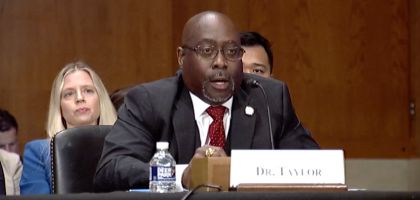News
ASAM President-Elect Testifies at Congressional Hearing in Favor of Bringing Addiction Care to Communities Across America

Dr. Stephen Taylor urges lawmakers to advance bills that would expand access to addiction care throughout the United States
ROCKVILLE, MD. – Today, Stephen M. Taylor, MD, MPH, DFAPA, DFASAM, President-Elect of the American Society of Addiction Medicine’s (ASAM), testified before the US Senate Committee on Health, Education, Labor, and Pensions (HELP)’s Subcommittee on Primary Health and Retirement Security during a hearing titled, “A Crisis in Mental Health and Substance Use Disorder Care: Closing Gaps in Access by Bringing Care and Prevention to Communities.” While recognizing the bipartisan work that Congress has done over the years to help address the deadliest addiction and overdose crisis in American history, Dr. Taylor urged members of the subcommittee to seize the opportunity to create a more sustainable and robust addiction care infrastructure.
“At a time of elevated death rates and medical complications associated with synthetic opioids like fentanyl, psychostimulants like methamphetamine, and the non-opioid veterinary tranquilizer xylazine, much more work needs to be done to create a sustainable and robust addiction care infrastructure – one that addresses addiction as a preventable and treatable chronic medical disease,” Dr. Taylor told lawmakers.
Dr. Taylor outlined gaps in the country’s addiction care infrastructure related to the addiction specialist physician workforce, access to methadone treatment for opioid use disorder (OUD), and enforcement of existing federal mental health and addiction parity law. For example, there are roughly only 7,000 physicians who are board-certified in addiction medicine or addiction psychiatry, while a national survey indicates over 40 million Americans with at least one substance use disorder (SUD). This suggests that there needs to be more medical professionals who specialize in the prevention, identification, and treatment of addiction.
In addition, by largely restricting access to methadone for treatment of OUD to opioid treatment programs (OTPs), the potential for expanded access to that addiction medication in this country remains severely limited, even though methadone has long played an important role in evidence-based care for OUD. Lastly, despite over a decade since the passage of the Paul Wellstone and Pete Domenici Mental Health Parity and Addiction Equity Act of 2008, which aims to prevent insurers from imposing less favorable benefit limitations on mental health/substance use disorder benefits than on medical/surgical benefits, Dr. Taylor noted that such parity of coverage for care remains elusive for millions of Americans suffering with mental health and substance use disorders. All of this contributes to the escalating overdose death rates across the United States.
Accordingly, Dr. Taylor urged the Subcommittee to focus on the following three areas in urgent need of policy intervention:
- Prioritization of the recruitment, training, and retention of addiction specialist physicians;
- Decriminalization of the prescribing of methadone for the treatment of OUD by addiction specialist physicians and OTP clinicians for dispensing at pharmacies; and
- Enforcement of federal mental health and addiction parity law that is already on the books.
The Subcommittee heard testimony on several bills, including three supported by ASAM. Those bills are:
- The Substance Use Disorder Treatment and Recovery Loan Repayment Program Reauthorization Act of 2023 (H.R. 3355), legislation that would reauthorize and strengthen the Health Resources and Services Administration (HRSA)’s Substance Use Disorder Treatment and Recovery Loan Repayment Program, or STAR-LRP. When individuals pursue a full-time job to provide substance use disorder treatment in high-need geographic areas, STAR-LRP can help them repay up to $250,000 in their student loans.
- The Modernizing Opioid Treatment Access Act (M-OTAA) (S 644/H.R.1359), legislation that would allow addiction specialist physicians and OTP clinicians to prescribe methadone for OUD treatment that can be picked up at pharmacies, subject to federal agency rules/guidance on supply of methadone for unsupervised use. Yesterday, nearly 100 stakeholder organizations sent a letter of support for M-OTAA.
- The Parity Enforcement Act, soon-to-be introduced legislation that would give the U.S. Department of Labor the authority to assess civil monetary penalties for violations of mental health and addiction parity requirements.
“These policies and resources are imperative to bringing addiction care into communities across this nation and to saving more lives,” Taylor testified.
To read Dr. Taylor’s complete testimony and view video from the hearing, CLICK HERE.
About ASAM
The American Society of Addiction Medicine (ASAM), founded in 1954, is a professional medical society representing over 7,000 physicians, clinicians and associated professionals in the field of addiction medicine. ASAM is dedicated to increasing access and improving the quality of addiction treatment, educating physicians and the public, supporting research and prevention, and promoting the appropriate role of physicians in the care of patients with addiction. For more information, visit www.ASAM.org.
# # #
Media Contact
Rebecca Reid
410-212-3843
